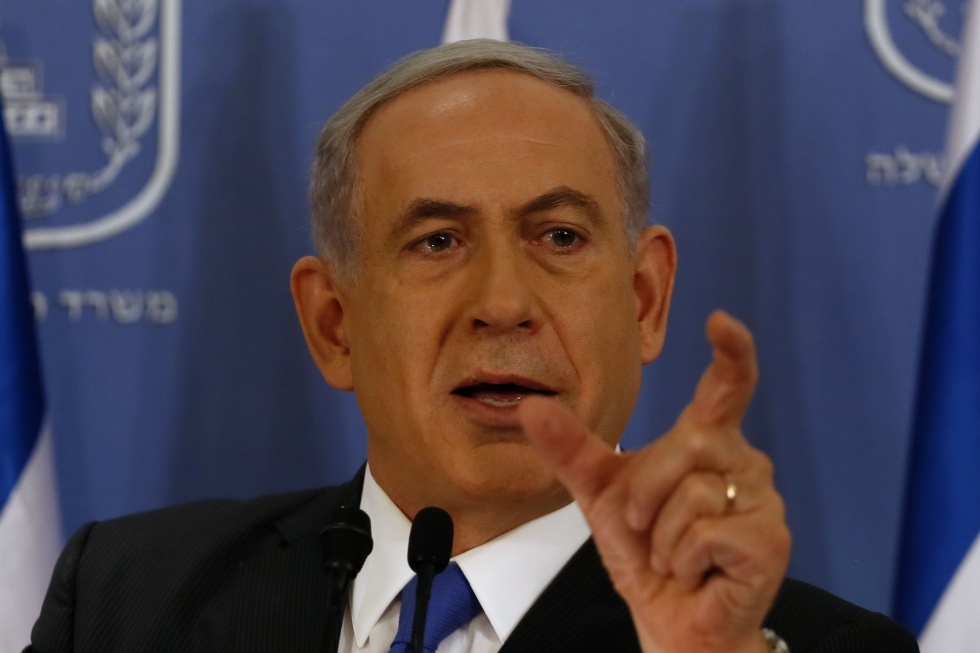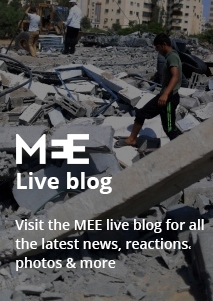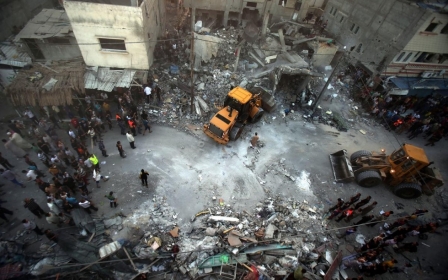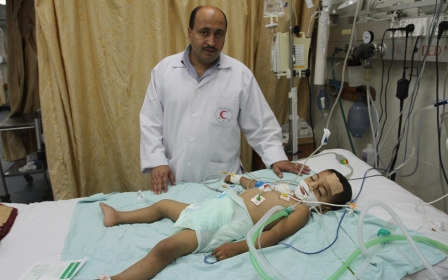Netanyahu: world pressure will not stop Israeli strikes on Gaza

Israeli Prime Minister Benjamin Netanyahu said on Friday that he will not bow to world pressure to stop a ferocious military campaign against rocket fire from the Gaza Strip.
As the military onslaught entered its fourth day and the death toll in Gaza passed 100, Netanyahu told reporters in the Defense Ministry's Kirya compound in Tel Aviv that, on the contrary, Israeli forces will intensify their air strikes on Gaza in coming days.
"No international pressure will prevent us from striking the terrorists who are attacking us," he said. "We are preparing for all options including ground operations. The goal is to restore calm and we will succeed in doing that."
With overnight strikes killing 14 Gazans and with a total number of 750 Gazans wounded, local hospital staff and international organisation warned that medical services in Gaza are on the brink of collapse.
More than 300 homes in Gaza have been destroyed or severely damaged and an estimated 2,000 Gazans have been made homeless, according to the UN Office for Coordination of Humanitarian Affairs in an emergency report published Friday.
On Friday morning, two Palestinians were killed and a third was wounded in an Israeli strike that targeted a car in central Gaza, pushing the death toll to 100, according to Gaza health ministry spokesman Ashraf al-Qudra.
Several other attacks - including two in Jabalia, north of Gaza City, which killed a 4-year-old and an elderly man, and another in Rafah which targeted a family home, killing five people - brought the death toll to 103 early Friday evening.
On Friday, fighters have fired 426 mortars and rockets that struck Israel, while another 121 rockets were intercepted by the Iron Dome missile defence system, an army spokeswoman said Friday.
So far, no Israelis have been killed.
Israel has authorised the call-up of 40,000 reservist troops, and threatened a ground operation.
Hamas's armed wing, the Ezzedine al-Qassam Brigades, has kept up a steady stream of rockets deep inside Israel, with sirens sending people fleeing for shelter in Jerusalem, Tel Aviv and even in the northern port city of Haifa.
Airport under fire
On Friday morning, three Gaza rockets were shot down over Tel Aviv by the Iron Dome anti-missile system, the army said, as the Brigades claimed their fighters had fired M75 missiles at Israel's main international airport.
Israel's Airport Authority said Ben Gurion airport had been closed for "nine minutes" during the raid, but then normal operations were resumed.
But Hamas warned "all foreign airlines" to halt flights due to "the dangers surrounding all the airports due to the ongoing war".
It has also called for mass demonstrations across the region as Muslims mark the second Friday of the holy month of Ramadan. Although police prepared for possible disturbances, there was no immediate reports of any protests.
A passenger jet heading to Tel Aviv was forced to make an emergency stop in Cyprus, before returning to Poland, aviation authorities said.
The Polish Lot aircraft "was instructed to wait in the air. The pilot decided to head to an alternative airport in Larnaca, and after waiting there, returned with the passengers to Poland."
UN: Israeli strikes on homes could breach laws of war
Israel could be violating the laws of war by bombing Palestinian homes in Gaza, the UN's human rights office said Friday.
"We have received disturbing reports that many of the civilian casualties, including of children, occurred as a result of strikes on homes," said spokeswoman Ravina Shamdasani.
"Such reports raise doubts about whether the Israeli air strikes have been in accordance with international humanitarian law and international human rights law," she told reporters.
International humanitarian law is UN-speak for the laws of war, and Shamdasani said targeting homes was a violation unless the buildings were being used for military purposes.
"In case of doubt, buildings that are ordinarily used for civilian purposes, such as homes, are presumed not to be legitimate military targets," she said.
"Even when a home is identified as being used for military purposes, any attack must be proportionate, offer a definite military advantage in the prevailing circumstances at the time, and precautions must be taken to protect civilians," she added.
"Military assets should not be located in densely-populated areas and attacks should not be launched from such areas," said Shamdasani.
"This is a call to the armed groups on the Palestinian side," she added, condemning their attacks on Israeli civilian areas, which have injured less than a dozen people.
"On the Israeli side, however, their responsibility in international law is very specific. If there is even an iota of a doubt, homes are not legitimate military targets. And if these homes are being used for military purposes, attacks must be proportionate, and precautions must be taken," said Shamdasani.
"It is incumbent on both parties to ensure that their military operations respect the law, no matter what the obstacles and no matter what the difficulties."
Charities urge end to Gaza violence
Meanwhile, a group of 34 charities and other non-governmental organisations signed a statement Friday urging an end to the deadly conflict between Israel and Hamas.
The statement was signed by groups including ActionAid, CARE, Oxfam and Save the Children and urged the international community to step up efforts to find a lasting solution to disputes in the region.
"Military actions by all parties must stop," the statement said.
"Since 2009, history has shown that military operations have failed to bring peace and security for people in Gaza and in Israel.
"Over the years we have repeatedly called for ceasefires and for all sides to protect civilians from harm.
"Sadly, these ceasefires have not lasted and we have had to revert back to life-saving relief and emergency programmes, aiding innocent people to cope with the trauma, and rebuilding Gaza time and time again."
New MEE newsletter: Jerusalem Dispatch
Sign up to get the latest insights and analysis on Israel-Palestine, alongside Turkey Unpacked and other MEE newsletters
Middle East Eye delivers independent and unrivalled coverage and analysis of the Middle East, North Africa and beyond. To learn more about republishing this content and the associated fees, please fill out this form. More about MEE can be found here.





